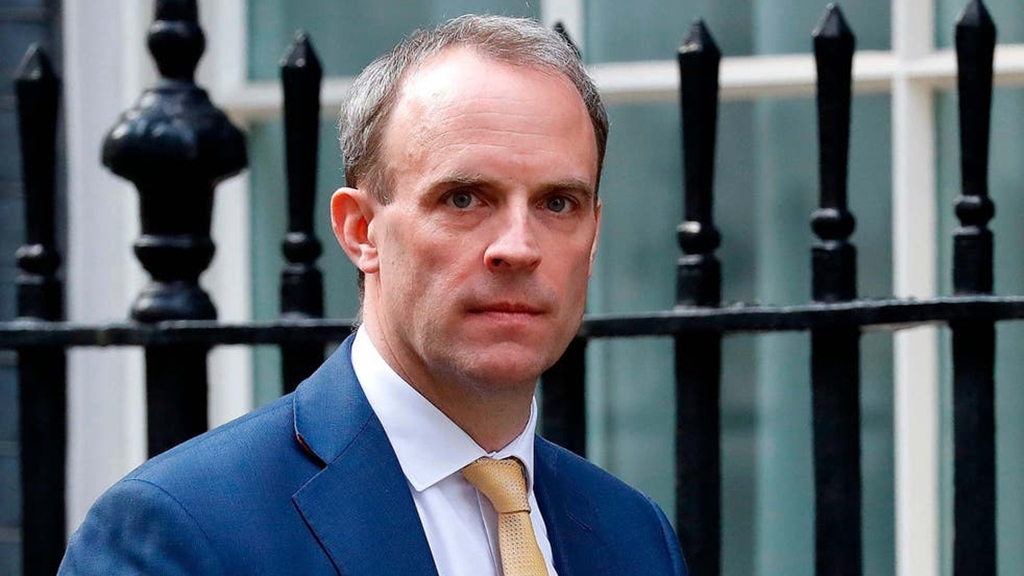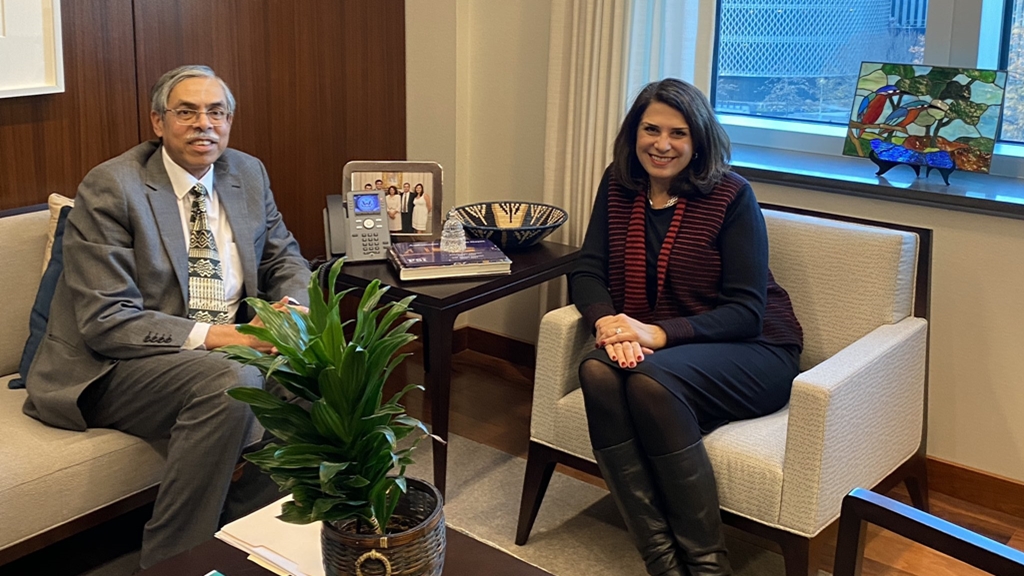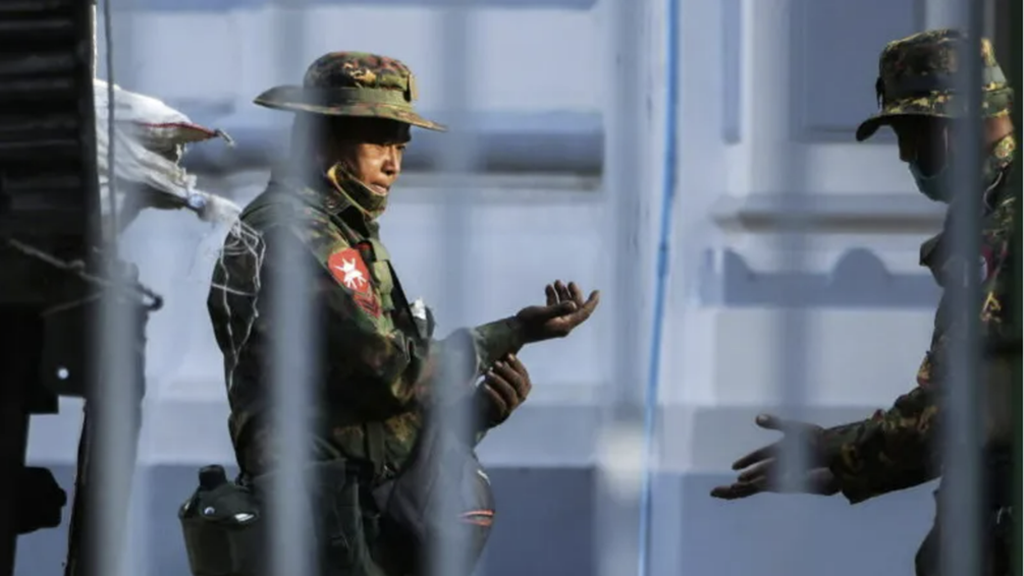
Why Is Dominic Raab Refusing To Act On Accountability for Burmese Military Crimes?
- 20/05/2021
- 0
By Burma Campaign UK
This briefing looks at the gap between the words and the actions of the British government when it comes to action on accountability.
At the same time as making repeated statements about holding the Burmese military to account for their crimes, British Foreign Secretary Dominic Raab is refusing to publicly support referring Burma to the International Criminal Court, and refusing to join the Rohingya genocide case at the International Court of Justice.
One of many examples of a British Government Minister talking about accountability since the military coup on 1st February 2021 came on Saturday 27th March.
Following the killing of more than 120 people by the Burmese military, Dominic Raab once again Tweeted about holding the military to account.
He stated:
“Today’s killing of unarmed civilians, including children, marks a new low. We will work with our international partners to end this senseless violence, hold those responsible to account, and secure a path back to democracy.”
At the same time Dominic Raab:
- Refuses to publicly support the UN Security Council referring Burma to the International Criminal Court.
- Refuses to join the Rohingya genocide case at the International Court of Justice.
- Repeatedly blocked amendments to bills in the British Parliament to enable determinations of genocide to be made and more action to be taken in response to genocide.
Impunity has encouraged further human rights abuses
As has been well documented, the Burmese military has been violating international law for decades.
It has done so with impunity at a domestic and international level. This impunity encourages further violations of international law and further horrific human rights violations.
During the past ten years, as the British government heralded a so-called democratic transition in Burma, human rights violations against ethnic minorities, so serious that they violate international law, actually increased.
There was increased conflict and human rights violations by the military in Kachin and Shan states and no significant action of any kind was taken by the British government, or the rest of the international community, to end impunity.
Warnings about escalating human rights violations against the Rohingya were also ignored by the British government. Even during the 2016 military offensive against Rohingya civilians, Burmese military head General Min Aung Hlaing was invited to a meeting of the EU Military Committee, a meeting of military heads of EU member states, which included the British military. Min Aung Hlaing was invited to give a speech as a guest of honour.
No immediate action was taken against the military for its human rights violations against the Rohingya in 2016, despite 80,000 people fleeing into neighbouring Bangladesh and the United Nations and others documenting widespread and systematic killings, and the systematic use of rape, including against children.
Instead, the UN Human Rights Council, with UK support, established a Fact-Finding Mission to establish the facts of what happened to the Rohingya in 2016, and regarding human rights violations in Kachin and Shan states. It was tasked to make recommendations on holding those responsible to account. The establishment of this UN Mission came almost six years after the military first broke ceasefires in Kachin and Shan States, deliberately targeted and killed civilians, and used rape as a weapon of war.
The UN Fact-Finding Mission published several reports, concluding that what took place met the legal definitions of genocide, war crimes and crimes against humanity. It made a series of recommendations to UN members on the action they needed to take in response. Not one government in the world implemented all of these recommendations.
A small number of countries, such as Canada, Sweden and Estonia, publicly support the Fact- Finding Mission recommendation to refer Burma to the International Criminal Court. The British government did not.
The British government and the rest of the international community need to reflect on whether the military being allowed to get away with genocide would have been a factor in their calculations as to whether they could get away with the coup without facing serious consequences from the international community.
Refusal to publicly support ICC referral
A referral of Burma to the International Criminal Court (ICC) would require a Resolution by the United Nations Security Council. Any such Resolution would likely be blocked by Russia and China using their veto power. The British government evades questions in Parliament about supporting a referral, citing the opposition of Russia and China. Or ministers make reference to it being an option, while deliberately avoiding explicitly saying the UK supports it as an option.
An example is here.
The British government has repeatedly publicly stated that it supports referring Syria to the International Criminal Court despite Russia and China also using their veto power to stop a referral. This inconsistency in approaches has not been explained by the government.
Russia and China have veto power over Resolutions at the UN Security Council. They do not have veto power over British government policy and statements.
A statement by Dominic Raab that the UK supports referring Burma to the ICC, even if it cannot be achieved at the current time, would be a lot more significant than his hollow tweets about accountability.
It is indicative of the weak response to genocide of the Rohingya and the military coup that Dominic Raab has so far been unwilling simply to say unequivocally that he supports a referral to the ICC. This is a recommendation of the UN Fact-Finding Mission on Myanmar. Why won’t Dominic Raab support a referral when there is overwhelming evidence that international crimes are being committed?
Refusal to join the Rohingya genocide case at the International Court of Justice
While claiming to be leading international action on Burma, it was in fact Gambia, not the British government, which showed leadership by taking Burma to the International Court of Justice for violating its obligations under the Genocide Convention.
The British government has made statements in support of the case but refuses to join it, despite cross party support for doing so. Canada and The Netherlands have announced their intention to join.
In December 2020 more than 100 British Parliamentarians, including former Foreign Secretary Jeremy Hunt MP, and Chair of the All- Party Group on Burma, Rushanara Ali MP, wrote to
Dominic Raab calling on him to join the case at the ICJ. The letter is available here.
A week before the military coup, Dominic Raab responded to the MPs, failing to agree to join the case. The letter is available here.
The Foreign Office strongly objects to our stating that they have refused to join the Rohingya genocide case at the ICJ. They have been saying for more than a year that they are ‘considering’ their position. It is our view that if the British government resists concerted pressure from Parliamentarians, human rights organisations and the Rohingya community for well over a year without changing their position, and is still not joining the case, that amounts to a refusal in practice.
After facing pressure throughout 2020, the British government then moved from only saying it was ‘considering’, to also saying it needed see what ‘added value’ their intervention would bring.
This is a strange response and appears to be a manufactured excuse to defend not joining the case. It is a delaying/deflecting tactic.
By taking this position regarding ‘added value’, the British government, which is making regular statements about ensuring accountability, is questioning whether there is any point in their joining the only international initiative to bring about accountability for the Rohingya genocide.
The governments of Canada and The Netherlands have announced their intention to intervene in the case. They are intervening specifically on the issue of sexual violence. Combating sexual violence is supposed to be a foreign policy priority of the British government. The British government founded the Preventing Sexual Violence Initiative. Thousands of Rohingya women, and children and men, were raped in the military offensives of 2016 and 2017.
A possible unspoken reason why the British government has been reluctant to join the genocide case is that it would have put them in a position where they are in direct conflict with Aung San Suu Kyi, who has staunchly denied genocide has taken place. Aung San Suu Kyi personally led her legal team to The Hague and defended the military against charges of genocide. While Aung San Suu Kyi was in government, the British government was unwilling to strongly challenge her over her own role in human rights violations against the Rohingya, including denial of citizenship.
The British government usually avoided naming Aung San Suu Kyi with regard to human rights violations her government was responsible for when talking about declining freedom of expression, media freedom and political prisoners – even the term political prisoners was generally avoided.
The approach of not standing up to Aung San Suu Kyi’s government regarding human rights violations against the Rohingya is a continuation of an approach adopted since the escalation of violence and repression against the Rohingya began in 2012.
For the so called ‘greater good’ of supporting the ‘reform process’, action was not taken regarding human rights violations, and in particular human rights violations against the Rohingya. It was felt by diplomats in many governments that pressuring Aung San Suu Kyi more strongly to change her approach on Rohingya issues would make her situation more difficult, and thereby undermine her position. For the sake of the so called ‘greater good’ of the reform process, rights of the Rohingya were not prioritised. This helped create conditions which enabled the genocide of the Rohingya to happen and, ironically, probably also helped enable the military coup to happen.
If the British government is still avoiding taking action on the rights of the Rohingya, such as joining the genocide case at the ICJ, because of concerns about the potential impact on the Bamar dominated democracy movement in central Burma, it has learnt no lessons at all.
It should have learnt that failing to act on the genocide of the Rohingya, or on international crimes against other ethnic groups, has emboldened the military, not encouraged reform.
Impunity for crime after crime after crime encourages and enables more crimes. This includes including encouraging the military to believe it can get away with a military coup, and so ending the reform process the British government, EU and USA were prepared to sacrifice the Rohingya for.
Genocide legislation in the UK
In late 2020 and early 2021 there were several moves by cross-party groups of British Parliamentarians to introduce amendments to legislation which would have empowered the British government to do more in response to genocide, wherever it took place.
All these efforts were fiercely opposed by the British government, which even went so far as using Parliamentary procedures to deny MPs the ability to vote on one amendment which was expected to pass.
The proposed amendments would have enabled British courts to make determinations of genocide and enabled economic action in response to genocide.
The lengths the British government went to in order to avoid having new powers to address genocide are indicative of the government’s lack of willingness to act on accountability, which is in sharp contrast to numerous statements from Dominic Raab and other ministers claiming to support accountability.
Supporting evidence collection
Holding the military to account requires the careful collection and preservation of evidence of their crimes. A normal response of the British government when challenged on its refusal to support an ICC referral and refusal to join the genocide case at the ICJ is to cite its role in establishing and financing the Independent Investigative Mechanism for Myanmar (IIMM).
The mandate of this mechanism is to collect and preserve evidence for future prosecutions. Its establishment was one of the recommendations of the United Nations Fact-Finding Mission and the British government can indeed claim credit for working for its establishment and for giving additional funding on top of the general UN funding mechanism for the IIMM. https://www.gov.uk/government/news/uk-announces-further-sanctions-on-myanmar-military-linked-companies
It is a rare example of the British government acting on accountability, which is no doubt why they cite it so often.The paradox is that the British government is supporting the collection of evidence while at the same time refusing to support court action where that evidence might be used.
Another concern that Burma Campaign UK has is the lack of British government financial support for civil society organisations in and from Burma which document human rights violations. These civil society organisations provide an essential role in the provision of information about human rights violations taking place. Burma Campaign UK has been advocating for more support for these organisations by the British government for almost 20 years.
The failure to fund civil society documenting human rights violations was highlighted by the International Development Committee as far back as 2007: https://publications.parliament.uk/pa/cm200607/ cmselect/cmintdev/645/64513.htm
“We recommend that DFID increase substantially the funding it gives to CBOs (Community Based Organisations) within Burma. Capacity-building and training of such groups is a crucial complementary strategy if funding is to be used effectively. Funding CBOs provides donors with the means to support human rights and democracy work within Burma.”
There has long appeared to be a reluctance by the British government to fund civil society organisations which document and do advocacy on human rights violations, especially ethnic civil society organisations. Supporting these organisations is also an essential part of supporting accountability.
In Summary
People in Myanmar, who are risking their lives, imprisonment and torture to win their freedom, are becoming increasingly frustrated with rhetoric and empty words from the international community, including from Dominic Raab.
More than 100,000 Rohingya who have been held in prison camps in Rakhine state since 2012, and more than a million Rohingya refugees in Bangladesh, in camps surrounded by barbed wire and with no prospect of returning home, are tired and frustrated of empty words and broken promises.
If Dominic Raab is convinced that his approach of refusing to support referring Burma to the ICC, and refusing to join the genocide case at the ICJ, is the right approach, then he should have the courage to go to the refugee camps in Bangladesh and explain to the people there why he thinks refusing to act is the right thing to do.
Burma Campaign UK works for human rights, democracy and development in Burma
